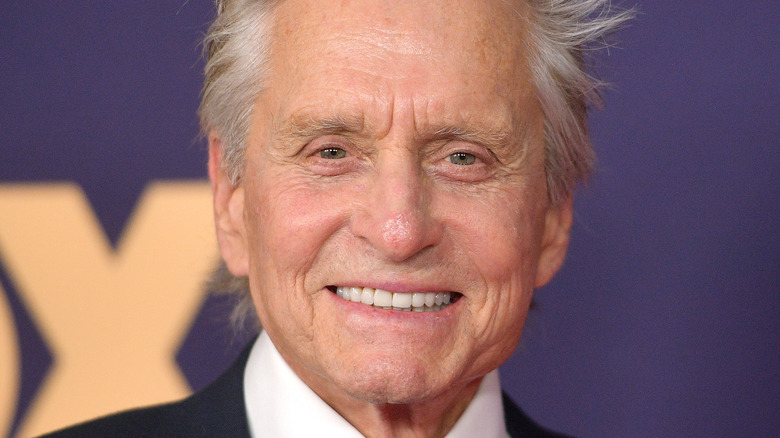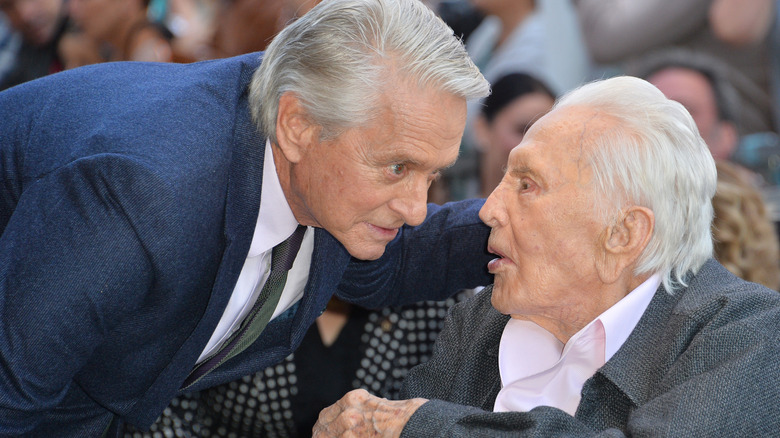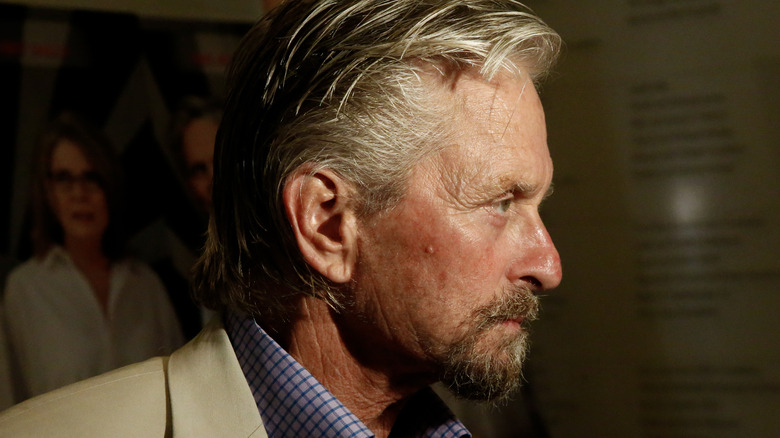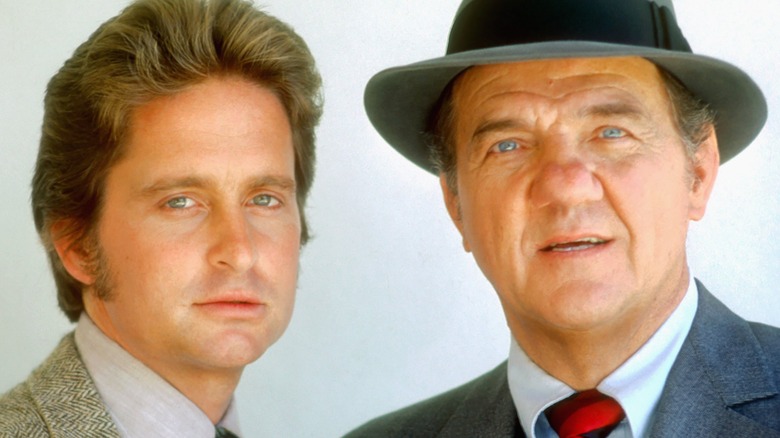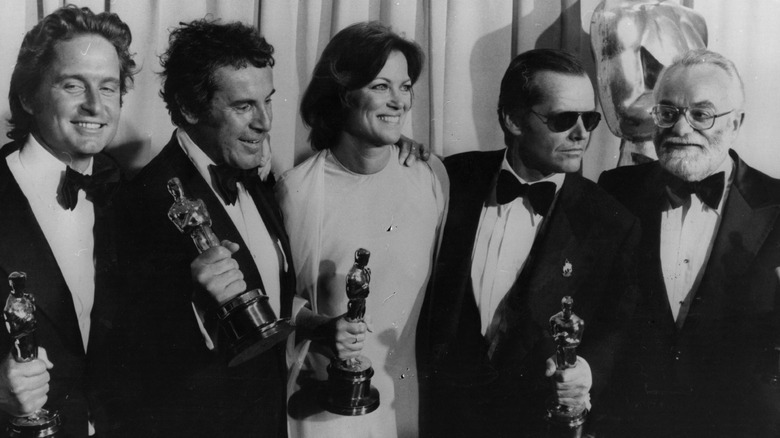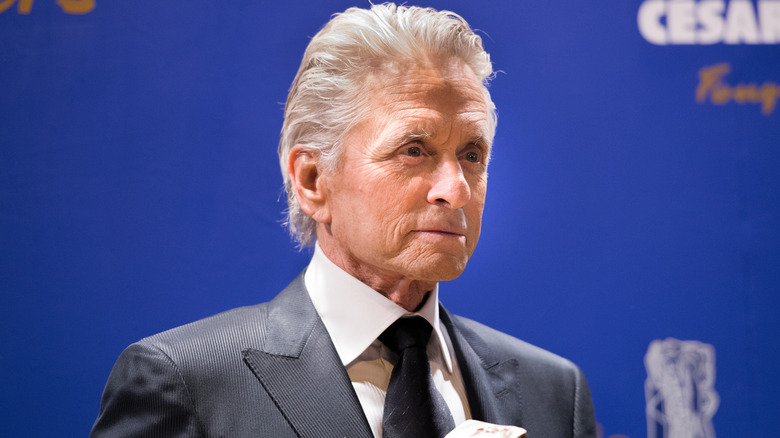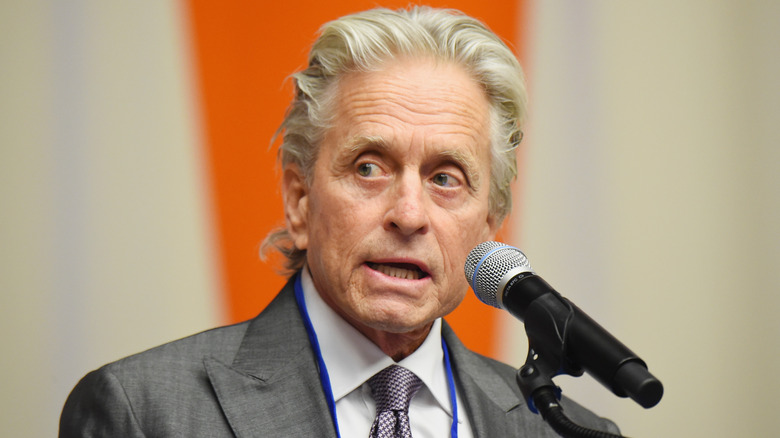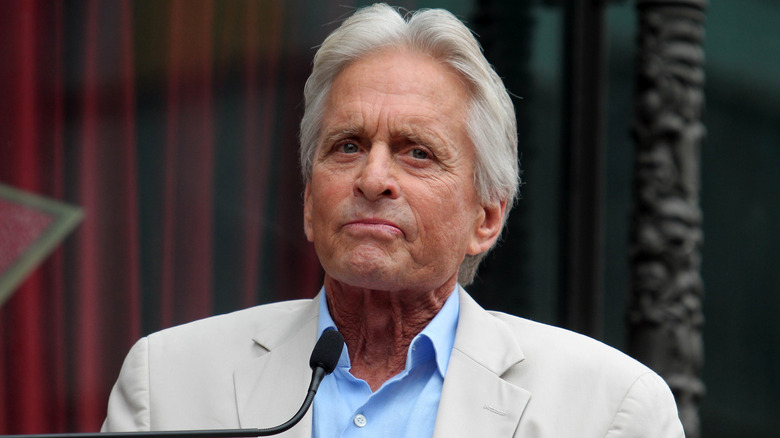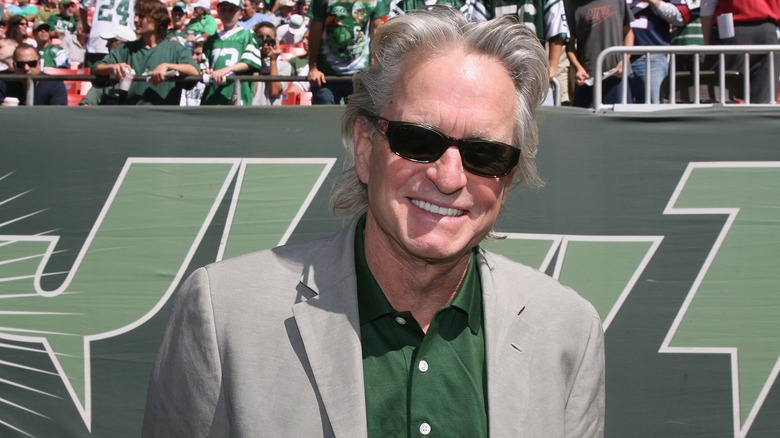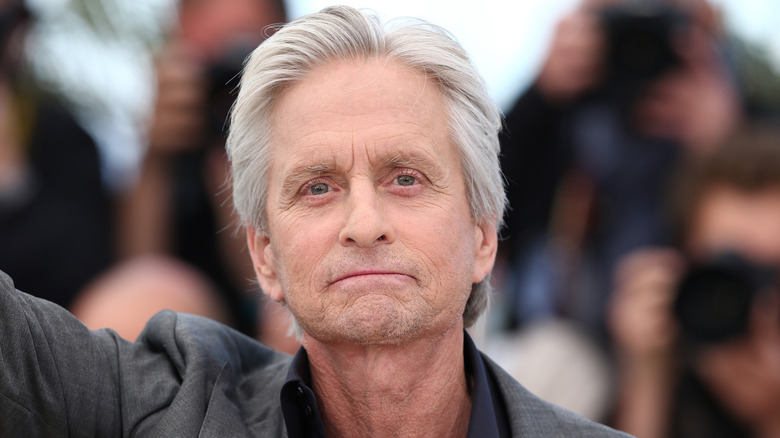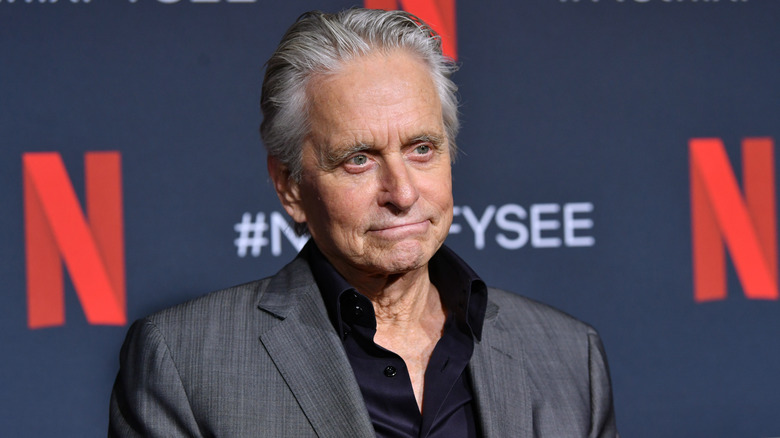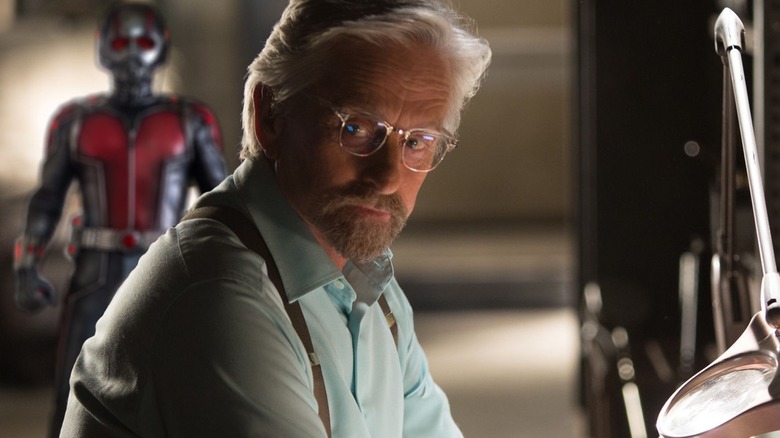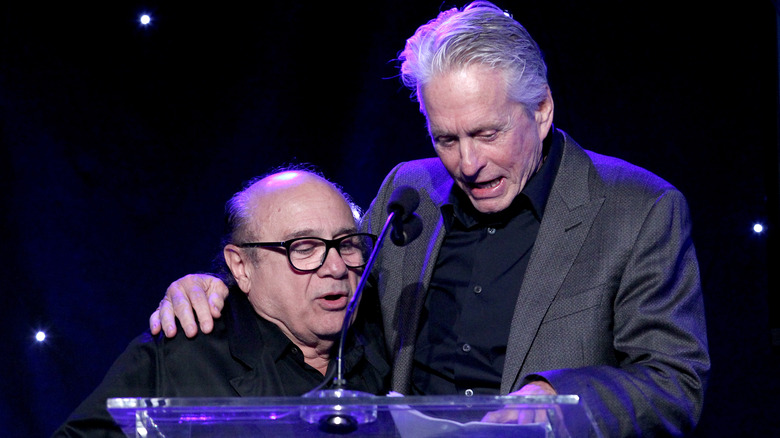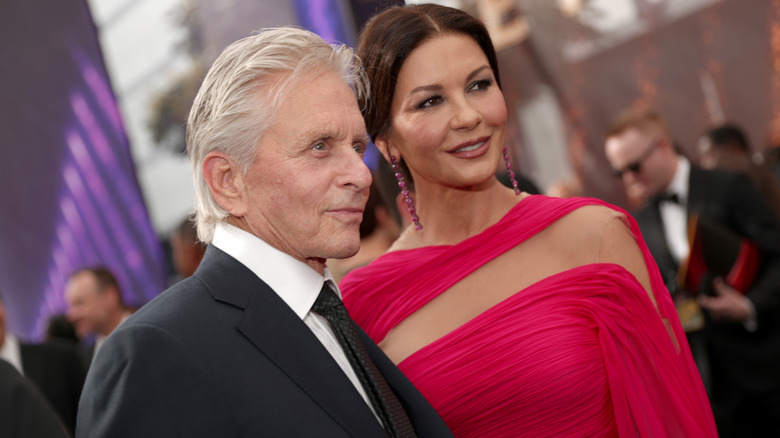The Untold Truth Of Michael Douglas
Michael Douglas is one of Hollywood's most recognizable stars. Like a lot of long-running actors, he has a type of character he's best known for — one who's morally ambiguous and cutthroat. Of course, he has a greater range than people sometimes give him credit for — if you doubt us, go take a look at his terrific portrayal of Liberace in 2013's "Behind the Candelabra" — but his signature style is definitely something a little more uncomfortable (e.g. "Wall Street," "Fatal Attraction").
An acting "brand" and a gift for strong performances can make viewers feel like they know an actor. But in Douglas' case, the performances don't let you know him at all. He doesn't have much in common with many of his characters, and even the tidbits that people do know about him are often misleading. We're glad to have the chance to explore some of his complex history and reveal his lesser-known lighter side. This is the untold truth of Michael Douglas.
Michael Douglas doesn't feel like 'show business royalty'
Since Michael Douglas is the son of legendary actor Kirk Douglas, it would be easy to assume that he grew up with his place in the industry already assured.
But the truth is, Douglas' destiny only seems obvious in retrospect. Speaking with AARP, Douglas said, "People have this idea that I'm part of show business royalty. I cherish the relationship I had with my father, and I'd love to fulfill the fantasy. But when I was young, he was a working actor and hadn't quite made it yet." If his father wasn't yet the king, he could hardly have grown up as a Hollywood prince. And his family history was too rocky for him to come of age feeling like he was part of some grand dynasty. He describes that part of his childhood as "awkward and tense," overshadowed by Kirk Douglas' guilt over "abandoning" his family when his marriage failed. They saw each other at holidays ... and for a time, that was about it.
Luckily, even if he didn't grow up with a "Hollywood pedigree," he still had a sense of stability, telling The Guardian, "I was fortunate to have a great stepfather and a lifestyle that [had] nothing to do with Hollywood."
He only studied acting because he couldn't think of another major
One of Michael Douglas' favorite interview stories is how he basically fell into acting. A self-described hippie in his early years, Douglas made it through three years of college just drifting. The school finally sat him down and told him none too gently that he had to declare a major. And then, according to an interview with Here & Now, he basically shrugged: "I said, 'I don't know, man, maybe theater arts.' My mother was an actress and my dad, but I had no interest, so I came to it reluctantly."
He didn't start out as an automatic talent either. He laughed as he told AARP, "I must say that my father, Kirk, came to just about every show I did, as busy as he was. And he told me right in the beginning, 'Son, you were awful. You just were awful.'" The criticism was evidently justified. "He was right!" Douglas told Rolling Stone. "It was in those early college productions. I started getting a little better, but I had a long way to go."
Kirk Douglas' concern for his son was — if blunt — sincere. Michael Douglas clarified it in the Here & Now interview, saying, "Our union runs at about 90% unemployment, and I think he was very worried after what he saw." He didn't want to see his son heading for disappointment. Luckily, the future couldn't have been brighter.
He got started in the business earlier than you might think
Even Michael Douglas admits that he didn't have a handle on his career until 1987, the year of "Fatal Attraction" and "Wall Street." He told Rolling Stone, "Up until then, I still dealt with nerves in front of a camera. I felt I was competent; I did 104 hours of a TV show! But I couldn't tell you that I was really enjoying the process or that people were benefiting from what I was doing."
But he did have that TV show, crime drama "The Streets of San Francisco," where he co-starred with Karl Malden. Back then, he admitted in an AARP interview, he "used to look at the camera like an X-ray machine in the dentist's office." But even though the role wasn't the one that made his career, it laid important groundwork. In particular, he's stayed grateful for Malden's attention and generosity. "He shared the spotlight, cared about others, said I was the son he never had. A good mentor can save you a lot of pain."
And in contrast to his career-making roles, his earlier parts were somewhat gentler. He was the good guy so often that he relished the chance to play a "rascal" in "Romancing the Stone." All this time later, it's hard to think of Michael Douglas struggling with being typecast as a knight in shining armor.
One Flew Over the Cuckoo's Nest kept coming back
Michael Douglas didn't really break out as an actor until the '80s, but he first made his mark as a producer in 1975 with "One Flew Over the Cuckoo's Nest."
Of course, he had an in — his father, Kirk Douglas, already owned the necessary rights. As Douglas told Here & Now, he asked his father for permission to produce and promised him the lead role. But raising the money took time. And as Douglas explained, "[By then], my father was a little older. Of course, he's never forgiven me for [not casting him], and I understand him, this is one of the great parts in your life." We bet there was at least one awkward family dinner after that.
As Douglas recounts in a Playboy interview, the production was intense and thrilling. They shot in a real state hospital in Salem, Oregon, and employed several patients at the hospital director's request. Douglas adds that what he didn't realize at first was that he hadn't necessarily assigned the patients the best jobs. "We had an arsonist working with turpentine with the painters. He had tried to burn the hospital down a year before. We had a murderer working with the electricians."
Needless to say, the movie was a huge success, taking home several Oscars. And it's continued to be a part of Douglas' career. In 2020, he produced the Netflix prequel series "Ratched."
Michael Douglas values professionalism above all else
Michael Douglas' biggest rule on the job is to help keep a set professional. "You know, when you're Number One on a call sheet, you set a tone on the set. If you're late to the set, other people will be late," he told Rolling Stone. Jerks unconsciously egg each other on, and bad behavior encourages bad behavior. That kind of thing can make a movie set miserable, so Douglas prefers to make sure he gets "talented people who are nice to work with."
In an AARP interview, he said the importance of that kind of no-nonsense dedication is something he picked up from his father, who taught him that "whatever you do, make sure you give your best effort and try as hard as you can." It's a message he wants to pass on to his own kids. In the same interview, Douglas named some of the values he hopes his children and grandchildren will share: "A work ethic. Courtesy to your fellow human beings. And kindness. Which are traits you have to work at and rehearse." That word "rehearse" is key, especially for an actor. It suggests that if you really want to live out the role of a good person, you have to work for it. Keep trying — especially if you know you might be setting an example.
He's a strong anti-war advocate
Michael Douglas is most famous as an actor and a producer, but he has a title with even more honor attached to it — a United Nations Messenger of Peace. For years now, he's worked to promote both nuclear disarmament and the weapons trade. He spoke about disarmament at a symposium in the Netherlands and narrated the anti-war film "Soldiers of Peace."
These are causes he's clearly passionate about. He's actually the longest-serving Messenger of Peace. The pro-disarmament angle, in particular, has always hit home for him. When he produced "The China Syndrome," he told NPR, he saw it as a horror film, plausible but fictional, and then, "It was almost exactly the same as what happened at Three Mile Island. ... It was uncanny, and it was an epiphany for me." His position was further strengthened when he looked into his family's background and found that his father's hometown had "disappeared because it was downwind from Chernobyl."
For a long time, Douglas admits, he was opposed to any kind of nuclear power at all, but he's come to reluctantly see it as a necessary source of clean, environmentally safe power. But his commitment against nuclear weapons — and weapons in general, including small arms — is still going strong, and his activism is an important part of his life.
Social media leaves him baffled
Michael Douglas used to avoid social media completely ... because he barely knew what it was. His total disconnect from the world of Twitter and Facebook once resulted in a particularly endearing gaffe, which he recounted for Toronto Life. "My father is referenced as the oldest person on MySpace, and I remember I once said on a show that my father has a profile on MyFace."
MySpace is mostly a thing of the past — the rueful Toronto Life interview is from 2009 — but some of Douglas' confusion ("Twitter? I can't get over this. How can people get things done?") still holds true. He finally caved and got an official Facebook page in 2013 and made his first Instagram post in late 2019. But his apparent Twitter account still isn't verified, and his follower count is surprisingly modest.
However, he blames social media for some of the acting industry's ills. In a 2015 interview with The Independent, he theorized that American actors were concentrating on image over craft. "In the States, we're going through a sort of social media image conscious thing rather than formal training. Many actors are getting caught up in this image thing, which is going on to affect their range." Douglas' screen presence packs considerably more of a wallop than his online presence — and maybe he's right, and that's for the best.
Never mind movies, he wants to talk about sports
Like a lot of actors, Michael Douglas has trouble watching his own movies. In an AARP interview, he admitted that he's "rarely seen any ... more than once," adding, "At the premiere, I just go through the red carpet and then out the back door. I love the process of making films, but I don't dwell." But his stance on going to the movies extends further than that. These days, he just doesn't watch many at all. They just don't have the right suspense.
"I'm a sports and news junkie because I don't know how they're going to end," Douglas told Toronto Life. "Unfortunately, for so many movies, I can guess the ending halfway through." If you crave the unpredictable, the news is definitely the way to go, but sports are probably more satisfying. (Maybe not, though. Douglas is above all else a huge Jets fan. "My condolences," Rolling Stone interviewer David Fear told him. It's been a rough few years.) He isn't kidding when he says sports surprise him more often than the movies, as he's paid the price. Whenever he went head-to-head with his father, Kirk Douglas, on a sports bet, the elder Douglas always came out ahead ... without even really following sports in the first place.
"He beats me all the time," Michael admitted to People in 2018. "I can pick any team, and he'll just take the other one ... and [yet] he cleans my clock."
His cancer diagnosis was surrounded by confusion
In 2010, Michael Douglas' future suddenly seemed uncertain. He announced that he had stage four cancer in his throat, and there isn't a stage five. But incredibly, Douglas has come back from what originally seemed like a death sentence. He attributes his remission — which seems potentially total — to the doctors he had at Memorial Sloan Kettering Cancer Center.
However, his cancer struggle was a confusing time. Douglas later revealed that he actually had tongue cancer, telling The Guardian that his doctor had advised him to fudge the truth a little. The surgeries to treat tongue cancer can be fairly radical — involving partial removal of the jaw and tongue — and Douglas wanted to avoid public speculation about that possibility.
The cause of his cancer has gotten plenty of speculation, especially after a controversial interview where Douglas voiced the theory that it came about due to an orally transmitted STD, human papillomavirus (HPV). At first, as The Washington Post noted, this resulted in a lot of internet uproar about whether or not cancer even worked like that. Douglas' health eventually became an important talking point in spreading cancer awareness.
Streaming helped bring him back to TV
Some of Michael Douglas' earliest roles were on TV, including his lead role on the cop show "The Streets of San Francisco." But for years, he was almost exclusively on the big screen. But now, he's on Netflix's sitcom "The Kominsky Method" and doing voice-acting on "Green Eggs and Ham." What changed?
It's simple — streaming. Speaking with Deadline, Douglas notes that the barrier between movies and TV has gotten a lot more porous lately, with most actors working in both. That wasn't something you would've seen a few decades ago. And in his case, the new format of streaming TV made all the difference. "I like to get things done," he told Deadline. "I've spent too much time in developmental hell." Streaming, which doesn't drag out production as much as network TV, makes shooting a TV show feel a lot more like shooting a movie. Suddenly, he's right at home.
He also thinks Netflix-style streaming improves the pacing of TV. "There's no commercials, so it's like a little movie, and you don't have to worry about forcing an act break or forcing a break for the commercial, it just likes to unfold itself." And pacing is especially important to him now that he's doing comedy, which is all about timing. He likes that, after all this time, it's still possible to take his career in new directions.
He values the chance to get silly
Prestigious actors have been part of superhero franchises for decades, so Michael Douglas finding a place in the "Ant-Man" movies isn't a surprise. But it's still a delight to see how thoroughly he's embraced his role as cantankerous rogue scientist Hank Pym.
Talking with Slashfilm, he enthused over — of all things — green screen. "I love this whole experience. ... 'Cause I never did green screen in my life. So the first one, it's the whole idea of talking to an ant on your shoulder and the characters and the breadth of imagination and what you can do, it's staggering." Tapping into his imagination seems to have the effect of making the movie seem like play rather than just work. And the "Ant-Man" movies are especially good for that, Douglas says. He likes that his branch of the franchise is one of the more openly humorous parts of Marvel. He also appreciates the science fiction angle. He was so struck by the set design, that, as he said, "I made a big effort to meet the production designers to see them because I thought it was just so cool."
A lot of Douglas' roles may be serious and even grim-faced, but he's anything but.
He and Danny DeVito have been friends for over 50 years
In the '60s, Michael Douglas shared an apartment with Danny DeVito. Decades later, their stretch as roommates remains a fond memory — even if, speaking with the Daily News, they can't decide which of them was the "slob" — and they're still close friends.
Over the years, they've collaborated frequently on great films like "One Flew Over the Cuckoo's Nest" (which Douglas produced) and "Romancing the Stone," with the more-connected Douglas even pulling some strings to advocate for DeVito's career. A profile in Closer, for example, reveals that Douglas helped his friend get above-title billing on "Romancing the Stone," which had a major impact on DeVito. "I had no idea this was going to happen," DeVito said. "That was a big, big thing."
The collaborations came about naturally because they just loved working together. As Douglas told Closer, "I realize now how much more fun it is when you're working with your friends."
Michael Douglas has one of the longest marriages in Hollywood
In 2000, Michael Douglas and Catherine Zeta-Jones got married — and accidentally ushered in waves of doomsaying about how their relationship wouldn't last. Douglas is 25 years older than Zeta-Jones, which, as The Guardian notes, got him derisively portrayed as her "sugar daddy husband." But despite the age difference — and despite all the gloomy speculation — their romance has lasted.
And they've talked about what makes their love last. "Communication and courtesy," Douglas summarized for Parade. Communication, courtesy, and, at least implicitly, gratitude and a little awe, at least on his part. "I've always tried to remember how fortunate I am and what an extraordinary lady she is." Zeta-Jones agrees that they're still going as strong as ever, even though, like everyone else, they've had their ups and downs. She told People, "The constant is love and respect. We've never, ever lost our sense of humor, and we enjoy each other's company." That's a recipe for success in or out of Hollywood.
